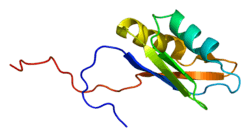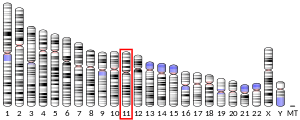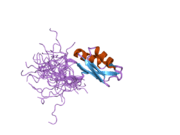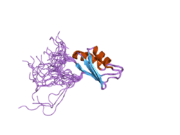RBM4
RNA-binding protein 4 is a protein that in humans is encoded by the RBM4 gene.[5][6][7]
References
- GRCh38: Ensembl release 89: ENSG00000173933 - Ensembl, May 2017
- GRCm38: Ensembl release 89: ENSMUSG00000094936 - Ensembl, May 2017
- "Human PubMed Reference:". National Center for Biotechnology Information, U.S. National Library of Medicine.
- "Mouse PubMed Reference:". National Center for Biotechnology Information, U.S. National Library of Medicine.
- Jackson FR, Banfi S, Guffanti A, Rossi E (Jul 1997). "A novel zinc finger-containing RNA-binding protein conserved from fruitflies to humans". Genomics. 41 (3): 444–52. doi:10.1006/geno.1997.4704. PMID 9169144.
- Lin JC, Tarn WY (Nov 2005). "Exon selection in alpha-tropomyosin mRNA is regulated by the antagonistic action of RBM4 and PTB". Mol Cell Biol. 25 (22): 10111–21. doi:10.1128/MCB.25.22.10111-10121.2005. PMC 1280272. PMID 16260624.
- "Entrez Gene: RBM4 RNA binding motif protein 4".
Further reading
- Maruyama K, Sugano S (1994). "Oligo-capping: a simple method to replace the cap structure of eukaryotic mRNAs with oligoribonucleotides". Gene. 138 (1–2): 171–4. doi:10.1016/0378-1119(94)90802-8. PMID 8125298.
- Suzuki Y, Yoshitomo-Nakagawa K, Maruyama K, et al. (1997). "Construction and characterization of a full length-enriched and a 5'-end-enriched cDNA library". Gene. 200 (1–2): 149–56. doi:10.1016/S0378-1119(97)00411-3. PMID 9373149.
- Andersen JS, Lyon CE, Fox AH, et al. (2002). "Directed proteomic analysis of the human nucleolus". Curr. Biol. 12 (1): 1–11. doi:10.1016/S0960-9822(01)00650-9. PMID 11790298.
- Bernert G, Fountoulakis M, Lubec G (2003). "Manifold decreased protein levels of matrin 3, reduced motor protein HMP and hlark in fetal Down's syndrome brain". Proteomics. 2 (12): 1752–7. doi:10.1002/1615-9861(200212)2:12<1752::AID-PROT1752>3.0.CO;2-Y. PMID 12469345.
- Strausberg RL, Feingold EA, Grouse LH, et al. (2003). "Generation and initial analysis of more than 15,000 full-length human and mouse cDNA sequences". Proc. Natl. Acad. Sci. U.S.A. 99 (26): 16899–903. doi:10.1073/pnas.242603899. PMC 139241. PMID 12477932.
- Petersen HH, Hilpert J, Militz D, et al. (2003). "Functional interaction of megalin with the megalinbinding protein (MegBP), a novel tetratrico peptide repeat-containing adaptor molecule". J. Cell Sci. 116 (Pt 3): 453–61. doi:10.1242/jcs.00243. PMID 12508107.
- Lai MC, Kuo HW, Chang WC, Tarn WY (2003). "A novel splicing regulator shares a nuclear import pathway with SR proteins". EMBO J. 22 (6): 1359–69. doi:10.1093/emboj/cdg126. PMC 151058. PMID 12628928.
- Ota T, Suzuki Y, Nishikawa T, et al. (2004). "Complete sequencing and characterization of 21,243 full-length human cDNAs". Nat. Genet. 36 (1): 40–5. doi:10.1038/ng1285. PMID 14702039.
- Diederichs S, Bäumer N, Ji P, et al. (2004). "Identification of interaction partners and substrates of the cyclin A1-CDK2 complex". J. Biol. Chem. 279 (32): 33727–41. doi:10.1074/jbc.M401708200. PMID 15159402.
- Gerhard DS, Wagner L, Feingold EA, et al. (2004). "The status, quality, and expansion of the NIH full-length cDNA project: the Mammalian Gene Collection (MGC)". Genome Res. 14 (10B): 2121–7. doi:10.1101/gr.2596504. PMC 528928. PMID 15489334.
- Rush J, Moritz A, Lee KA, et al. (2005). "Immunoaffinity profiling of tyrosine phosphorylation in cancer cells". Nat. Biotechnol. 23 (1): 94–101. doi:10.1038/nbt1046. PMID 15592455.
- Rual JF, Venkatesan K, Hao T, et al. (2005). "Towards a proteome-scale map of the human protein-protein interaction network". Nature. 437 (7062): 1173–8. doi:10.1038/nature04209. PMID 16189514.
- Kimura K, Wakamatsu A, Suzuki Y, et al. (2006). "Diversification of transcriptional modulation: large-scale identification and characterization of putative alternative promoters of human genes". Genome Res. 16 (1): 55–65. doi:10.1101/gr.4039406. PMC 1356129. PMID 16344560.
- Kar A, Havlioglu N, Tarn WY, Wu JY (2006). "RBM4 interacts with an intronic element and stimulates tau exon 10 inclusion". J. Biol. Chem. 281 (34): 24479–88. doi:10.1074/jbc.M603971200. PMC 2072872. PMID 16777844.
- Markus MA, Heinrich B, Raitskin O, et al. (2006). "WT1 interacts with the splicing protein RBM4 and regulates its ability to modulate alternative splicing in vivo". Exp. Cell Res. 312 (17): 3379–88. doi:10.1016/j.yexcr.2006.07.008. PMID 16934801.
- Lin JC, Hsu M, Tarn WY (2007). "Cell stress modulates the function of splicing regulatory protein RBM4 in translation control". Proc. Natl. Acad. Sci. U.S.A. 104 (7): 2235–40. doi:10.1073/pnas.0611015104. PMC 1893002. PMID 17284590.
This article is issued from Wikipedia. The text is licensed under Creative Commons - Attribution - Sharealike. Additional terms may apply for the media files.






